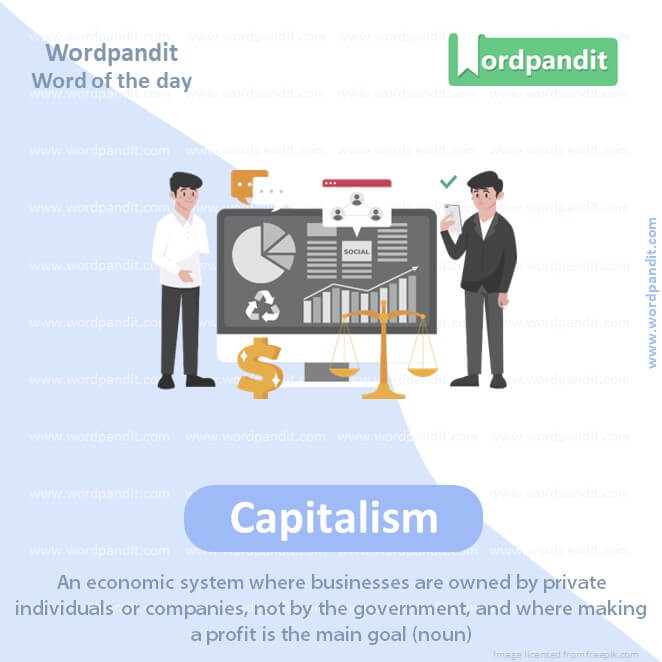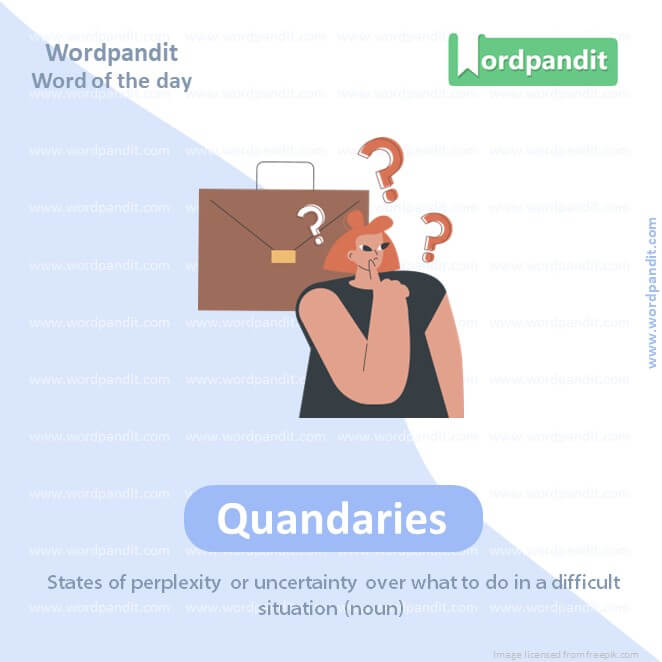Daily Vocabulary Words: List of Daily Used Words in Leading Indian Newspapers
Hi there. Welcome to this special section @ Wordpandit. Our endeavour here is straightforward: highlighting daily vocabulary words that you would come across in leading newspapers in the country. We have included the following newspapers in our selection:
• The Times of India
• The Economic Times
• Hindustan Times
• Mint
• Indian Express
We are putting in extensive work to develop your vocabulary. All you have to do is be regular with this section and check out this post daily. This is your repository of commonly used words; essentially, we are posting a list of daily used words. Hence, this has significant practical application as it teaches you words that are commonly used in leading publications mentioned above.
Visit the website daily to learn words from leading Indian newspapers.

WORD-1: Capitalism
CONTEXT: From capitalism, free speech, democracy and open access to public spaces to questions about their future, Zoya Akhtar’s The Archies, set in 1964, encapsulates the anxieties of Gen Z in 2023. Akhtar’s adaptation of the 1941 comic invites those born post-2000 to identify with the trials and tribulations of being young in a confusing world.
SOURCE: The Indian Express
EXPLANATORY PARAGRAPH: Imagine a big store where people can buy and sell things they’ve made or own. In capitalism, anyone can try to make their own store or company, and they can decide what to sell and for how much. It’s like when you decide to sell lemonade in your yard; you choose the price and keep the money you make.
MEANING: An economic system where businesses are owned by private individuals or companies, not by the government, and where making a profit is the main goal (noun).
PRONUNCIATION: “CAP-i-tal-izm”
SYNONYMS: Free market, Free enterprise, Laissez-faire, Market economy, Privatization.
USAGE EXAMPLE:
1. Many countries operate under capitalism, allowing businesses to compete.
2. In capitalism, success often depends on how good your product or service is.
3. The rise of small businesses is a key feature of capitalism.
4. Critics of capitalism argue it can lead to inequality.

WORD-2: Free Speech
CONTEXT: From capitalism, free speech, democracy and open access to public spaces to questions about their future, Zoya Akhtar’s The Archies, set in 1964, encapsulates the anxieties of Gen Z in 2023. Akhtar’s adaptation of the 1941 comic invites those born post-2000 to identify with the trials and tribulations of being young in a confusing world.
SOURCE: The Indian Express
EXPLANATORY PARAGRAPH: Free speech is like being allowed to say what you think and feel without getting in trouble, as long as it’s not mean or hurting anyone. It’s like if you tell your friend that you don’t like carrots, you can say it because it’s your own idea.
MEANING: The right to express any opinions without censorship or restraint (noun).
PRONUNCIATION: “Free SPEECH”
SYNONYMS: Freedom of expression, Free expression, Open speech, Liberty of speech, Right to speak.
USAGE EXAMPLE:
1. Free speech allows people to share their thoughts openly.
2. In a democracy, free speech is a fundamental right.
3. Protests often represent an exercise of free speech.
4. Limitations on free speech can lead to censorship.
WORD-3: Encapsulates
CONTEXT: From capitalism, free speech, democracy and open access to public spaces to questions about their future, Zoya Akhtar’s The Archies, set in 1964, encapsulates the anxieties of Gen Z in 2023. Akhtar’s adaptation of the 1941 comic invites those born post-2000 to identify with the trials and tribulations of being young in a confusing world.
SOURCE: The Indian Express
EXPLANATORY PARAGRAPH: Encapsulates is like putting something big into a tiny, easy-to-understand package. It’s like taking a long story and telling it in just one short sentence that still tells you what the story is about.
MEANING: To express the essential features of something succinctly or to contain something completely (verb).
PRONUNCIATION: “En-CAP-suh-lates”
SYNONYMS: Summarizes, Comprises, Condenses, Epitomizes, Abstracts.
USAGE EXAMPLE:
1. The book encapsulates the history of the war in a few pages.
2. Her speech encapsulates the main points of the debate.
3. The movie’s title encapsulates its theme.
4. The phrase “time is money” encapsulates a key economic principle.
WORD-4: Trials and tribulations
CONTEXT: From capitalism, free speech, democracy and open access to public spaces to questions about their future, Zoya Akhtar’s The Archies, set in 1964, encapsulates the anxieties of Gen Z in 2023. Akhtar’s adaptation of the 1941 comic invites those born post-2000 to identify with the trials and tribulations of being young in a confusing world.
SOURCE: The Indian Express
EXPLANATORY PARAGRAPH: Trials and tribulations are like the challenges or tough times you face, kind of like when you have a hard puzzle to solve or when you keep trying to win a game that’s difficult. They are the problems and hard things you have to deal with.
MEANING: Experiences that test one’s endurance, patience, or faith, often difficult or unpleasant (noun).
PRONUNCIATION: “TRY-als and tri-bew-LAY-shuns”
SYNONYMS: Hardships, Struggles, Adversities, Difficulties, Challenges.
USAGE EXAMPLE:
1. Every hero in stories faces trials and tribulations.
2. The trials and tribulations of early settlers were many.
3. Overcoming trials and tribulations can make people stronger.
4. She spoke about the trials and tribulations of her journey.
WORD-5: Analogue
CONTEXT: The group’s understanding of corporate greed and development is formulated early through personal experiences: Betty (Khushi Kapoor) has to navigate the closing of her father’s bookshop in favour of a bookstore chain — the Amazon of analogue times.
SOURCE: The Indian Express
EXPLANATORY PARAGRAPH: Analogue is like something that is similar or almost the same as something else, but not exactly. It’s like having a toy car that looks like a real car but is smaller and doesn’t work the same way.
MEANING: Something comparable to something else in function or characteristics (noun); relating to or using signals or information represented by a continuously variable physical quantity (adjective).
PRONUNCIATION: “AN-uh-log”
SYNONYMS: Similar, Equivalent, Comparable, Corresponding, Parallel.
USAGE EXAMPLE:
1. That toy is an analogue of a real car.
2. The analogue clock uses hands to show time.
3. They found an analogue in nature for the new technology.
4. Analogue signals are different from digital signals.

WORD-6: Quandaries
CONTEXT: Meanwhile, other members of the gang attend to quandaries in their personal lives. Archie has to decide between moving to England for college or following in his father’s Swades-esque footsteps and staying in India to “give back”.
SOURCE: The Indian Express
EXPLANATORY PARAGRAPH: Quandaries are like being stuck between deciding if you want chocolate or vanilla ice cream and it’s hard to choose. It’s when you’re not sure what to do because both choices seem good or bad.
MEANING: States of perplexity or uncertainty over what to do in a difficult situation (noun).
PRONUNCIATION: “KWON-dare-ees”
SYNONYMS: Dilemmas, Predicaments, Conundrums, Impasses, Stalemates.
USAGE EXAMPLE:
1. He was in a quandary about which college to attend.
2. The unexpected results left the scientists in a quandary.
3. Ethical issues often present moral quandaries.
4. They faced a quandary in choosing the right path.

WORD-7: Flurry
CONTEXT: Since Akhtar announced The Archies in 2021, there has been a flurry of debate around the “nepo” bandwagon cast in the film.
SOURCE: The Indian Express
EXPLANATORY PARAGRAPH: Flurry is like when a lot of things happen quickly one after the other, like when leaves fall from the trees really fast on a windy day, or when you get lots of birthday messages at the same time.
MEANING: A sudden short period of activity or excitement (noun); to move in a quick or busy manner (verb).
PRONUNCIATION: “FLUR-ee”
SYNONYMS: Burst, Rush, Spurt, Outburst, Gust.
USAGE EXAMPLE:
1. A flurry of activity happened when the store opened.
2. Snow flurries began in the evening.
3. She flurried around the kitchen preparing dinner.
4. News of the event caused a flurry on social media.
 WORD-8: Bandwagon
WORD-8: Bandwagon
CONTEXT: Since Akhtar announced The Archies in 2021, there has been a flurry of debate around the “nepo” bandwagon cast in the film.
SOURCE: The Indian Express
EXPLANATORY PARAGRAPH: Bandwagon is like when a lot of people start liking something, and then more and more people join in because it’s popular. It’s like when everyone in your class starts liking a new game, and then you want to play it too.
MEANING: A popular trend that attracts growing support (noun); to join or give support to a popular trend or activity (verb).
PRONUNCIATION: “BAND-wag-un”
SYNONYMS: Trend, Craze, Fad, Vogue, Rage.
USAGE EXAMPLE:
1. Many people jumped on the bandwagon after the team started winning.
2. The new fashion trend created a bandwagon effect.
3. Companies often try to capitalize on the latest bandwagon.
4. Social media can accelerate the bandwagon phenomenon.
WORD-9: Blatantly
CONTEXT: Of course, there is much to discuss when it comes to the blatantly unfair opportunities hand-delivered to Suhana Khan and Agastya Nanda. But aside from that debate around the film, there is also much in the film for the rest of us to come away with. It urges young people to stand up and fight for the causes they believe in, whether their protest registers a difference is irrelevant.
SOURCE: The Indian Express
EXPLANATORY PARAGRAPH: Blatantly is like doing something really obvious and not hiding it at all. It’s like if you took a cookie from the jar and ate it in front of everyone without trying to hide it.
MEANING: In an open and unashamed manner, clearly or obviously (adverb).
PRONUNCIATION: “BLAY-tent-lee”
SYNONYMS: Obviously, Flagrantly, Clearly, Overtly, Unmistakably.
USAGE EXAMPLE:
1. He blatantly ignored the rules.
2. The mistake was blatantly obvious.
3. She blatantly lied to everyone’s face.
4. The sign was blatantly disregarded by passersby.
WORD-10: Irrelevant
CONTEXT: Of course, there is much to discuss when it comes to the blatantly unfair opportunities hand-delivered to Suhana Khan and Agastya Nanda. But aside from that debate around the film, there is also much in the film for the rest of us to come away with. It urges young people to stand up and fight for the causes they believe in, whether their protest registers a difference is irrelevant.
SOURCE: The Indian Express
EXPLANATORY PARAGRAPH: Irrelevant is like talking about something that has nothing to do with what everyone else is talking about. Like if you’re talking about your favorite animals, and someone starts talking about their lunch. It doesn’t match the topic.
MEANING: Not connected with or relevant to something (adjective).
PRONUNCIATION: “ir-REL-uh-vuhnt”
SYNONYMS: Unrelated, Inapplicable, Off-topic, Extraneous, Beside the point.
USAGE EXAMPLE:
1. That fact is irrelevant to our discussion.
2. The comment was completely irrelevant to the conversation.
3. They dismissed the irrelevant details.
4. His opinion on the matter was seen as irrelevant.
Vocabulary Daily Use Words
In the architecturally diverse world of language learning, ‘vocabulary daily use words’ act as a cornerstone. We often take these words for granted, but their significance in day-to-day communications is nothing short of monumental. Mastering these ‘vocabulary daily use words’ should be more than an ancillary task on the sideline; it should take the center stage in your language learning journey.
To begin with, approach ‘vocabulary daily use words’ with the same gusto and reverence as you would an untapped treasure chest. Go beyond the conventional realm of textbooks and explore the world of contemporary literature, newspapers, and digital content. By immersing yourself in these mediums, you’re aligning your learning with real-world language usage, thereby gaining a practical understanding of ‘vocabulary daily use words.’
Memory-enhancing tools add an extra layer of effectiveness to your learning. Flashcards, for example, are a great way to make your study sessions interactive and memory-forging. Coupled with the Leitner system, which is a principle of spacing and repetition, you can ensure better recall and understanding of ‘vocabulary daily use words.’
Furthermore, leveraging mnemonic devices aids in etching the ‘vocabulary daily use words’ into your memory. Associating common words with unique and memorable narratives in your mind enhances their recall. Regular revision and using these words in routine conversations further cement your proficiency.
The potency of immersion as a language learning strategy cannot be emphasized enough. Conversing with native speakers, if possible, provides context to ‘vocabulary daily use words’ and boosts your fluency.
In conclusion, mastering the ‘vocabulary daily use words’ is an enriching journey that requires ongoing effort, continual exposure, and hands-on practice. The strategy of learning through various mediums, using memory-enhancing techniques, leveraging mnemonic devices, and immersion can help demystify these words and enhance your overall language proficiency. So, gear up and embrace the linguistic adventure of mastering the ‘vocabulary daily use words.’













